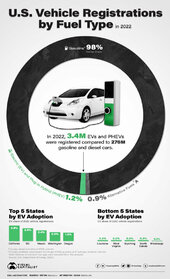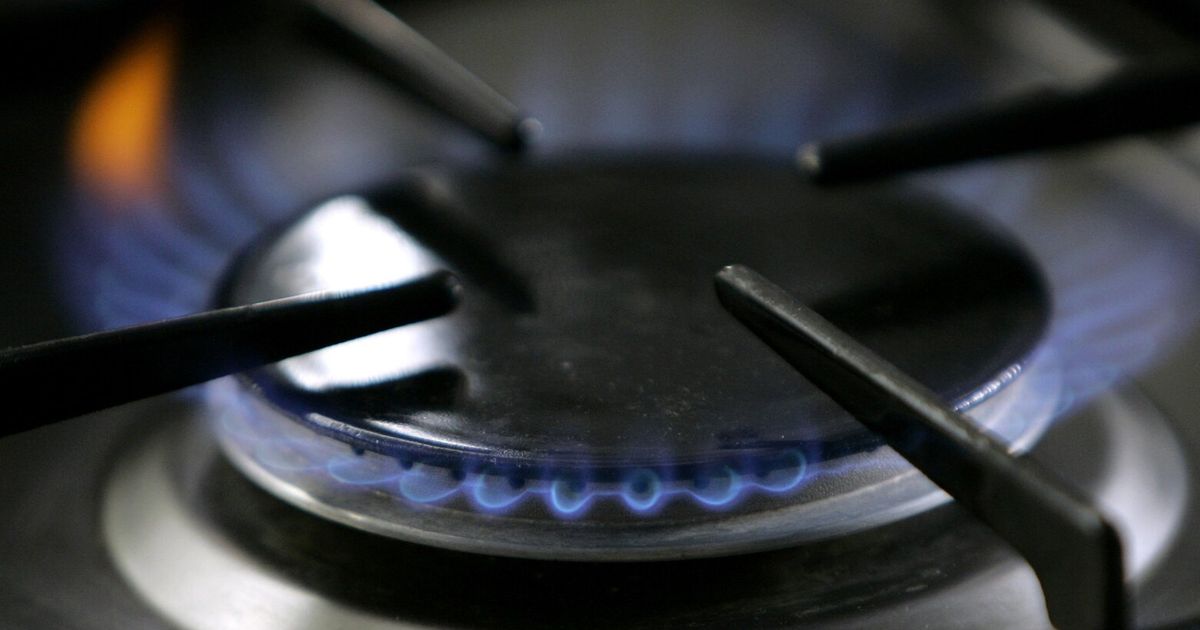that isn't camping, princessMy 40' motorhome will weigh like 60,000 pounds just from batteries to get me from campground to campground.
But then, tree huggers don't think about that, they camp in tents.
You are using an out of date browser. It may not display this or other websites correctly.
You should upgrade or use an alternative browser.
You should upgrade or use an alternative browser.
Half price electric cars
- Thread starter Tulex
- Start date
Brucey
Solar Wizard
This one is from 2022, despite increases in bev sales the proportion of the total market is still tiny, even Tesla crazy states like CA:This is a pretty good article summarising the current state of EV adoption around the world.

Electric Cars Pass the Tipping Point to Mass Adoption in 31 Countries
Once 5% of new-car sales go fully electric, everything changes — according to a Bloomberg Green analysis of transitions underway across four continents.www.bloomberg.com
This is BEV sales (not including PHEVs):
View attachment 205724
Discusses reasons why the US lags the world with adoption, and the general trend with adoption as has occurred time and again with such technology.

Manufacturing an electric vehicle consumes far more energy than an ICE. Most of this additional energy is spent mining the materials for and manufacturing an EV’s giant lithium-ion battery.
Mining companies use energy-intensive trucks, crushers, and mills to extract each battery’s nickel, cobalt, lithium, and copper. The manufacturing process consumes vast amounts of energy as well. Many analysts eagerly tout the carbon savings from displaced fossil fuels without adequately accounting for the battery’s increased energy consumption. Once these adjustments are made, most, if not all, of the EV’s carbon advantage disappears.
If our models are correct, EVs will fail on two fronts: they are less energy efficient than the ICEs they are trying to replace and their adoption will do little to mitigate carbon emissions.
Policymakers often tout Norway as the ultimate EV success story. Thanks to massive subsidies, EVs made up 80% of all Norwegian new car sales in 2022 and currently account for 20% of the total car fleet. Policymakers hope all developed countries will ultimately adopt Norway’s model. However, upon closer inspection, Norway's experience does more to warn of EVs’ shortcomings than advocate for their adoption.
The first problem is financial. The Norwegian government offers consumers massive subsidies to purchase an EV. New vehicles are exempt from several onerous taxes and the 25% VAT. On average, a large new ICE would be subject to $27,000 in various taxes; an equivalent EV would pay none. Next, Norway exempts EVs from any road or ferry tolls and allows them to use bus lanes, offers free parking and charging in municipal areas, and ensures “charging rights” in apartment buildings. Although Norway rolled back some of these operating subsidies starting in 2017, an Oslo resident can still expect these benefits to total $8,000 annually.
Norway is one of the wealthiest countries in the world, with a per capita GDP of $106,000 in 2022. Despite its impressive wealth, the government must still financially incentivize its citizens to purchase EVs.
The benefits are starting to take their toll on Norway’s finances. At nearly $4 billion annually, Norway spends as much on EV subsidies as on total highway and public infrastructure maintenance. The program has also raised significant issues around equality in Norway. EV subsidies favor high-income urban citizens, who take advantage of free tolls, parking, and charging and avoid the onerous tax on larger luxury vehicles. Several populist-leaning political groups in Norway have made so-called “elitist” EV subsidies a focal point of their platform.
Haze
New Member
- Joined
- Mar 6, 2021
- Messages
- 142
I’m wondering how many folks will be upset when local governments add a flat fee “ Tax “ for every time you go to refill that EV ? Won’t be long till EV’s are asked to pay their fair share no different than ICE vehicles. You want to fill your tank at this supppppper charger…no problem that will be a small $10 tax to our local city.
Last edited:
Houses built before the 60’s were designed around natural cooling. Central air paths, high ceilings, large awnings at windows, under shade trees, and with metal radiant reflective roofs… or slate tiles, ceramic adobe etc…I don't know how old you are but I remember a time when Air Conditioning was not really needed in the Summer. We had it in the house but very rarely used it.
I also remember it snowing before Christmas and the rain falling in the rainy season.
Today AC is not optional during the summer!
We had 25 years of people even denying that Climate Change was even happening.
Now there is really no one left that is doubting Climate change. Just people trying to come up with other excuses about why it is happening other than the "Elephant in the room" levels of CO2 in the Atmosphere.
If your waiting for some kind of public consensus on what to do then we will be stuck in this problem until it's way too late to reverse or slow it down.
Today, homes are built to LOOK good, not for effective comfort in hot weather. Dark asphalt shingles. Closed rooms, heavy insulation, sealed airspace’s. Designed around the central Hvac system.
Back in the day, People hung wet sheets in doorways, and utilized evaporative cooling to get a modicum of comfort… and in the 40’s when refrigeration/AC came out, people FLOCKED to the movie theaters where it was being used… and started buying ac as quickly as they could afford it. I don’t know how old ya are, but I cannot imagine a day when comfort Hvac wasn’t needed in hot humid climates…
Now… in MANY areas of the planet, air conditioning wasn’t needed before the last 20 years, and in many of THOSE areas, it is starting to be needed… most euro cars did not come equipped with ac in them, and when those cars were imported to the states, they got aftermarket ac put in. I don’t know if it was an economic reason, or if ac wasn’t needed in Germany or much of Europe… but it is true.
I remember when I first started the HVAC firld in the early 80’s, and when installing ac in the homes, I had to install the entire ductwork system, because most homes only had window units in them for ac… the houses were not built with central air installed.
one aspect of ev use that gets me is fuel tax to the DMV… in the 90’s and such when waste oil fuel use started becoming popular, the tax man wanted your mileage tracked, and WVO use reported to tax you road taxes for supporting the DMV… what are the trends with ev use? Zero fuel tax being collected… is the mileage being reported, and you get a big DMV bill on your taxes every April fools day?Yes it did take combining two useful technologies to make a more useful machine. The same is true of hybrid fuel/electric vehicles, which have the benefits of both.
The system is forcing a neutered version of a machine as the ultimate when it clearly is not. A BEV may work for all kinds of situations, but it is not at all the most capable, versatile or safe option for every situation.
The tiny foothold that EV's are gaining is in large part due to the taxpayers incentivizing people to purchase a certain type of product. This is unnatural and does not mean that it is what people want. We never needed incentives to get people to buy electric golf carts, because people like them and buy them. They work great for short stop and go trips and cost little to operate.
EVs are feasible now and were when they were invented, but they are inferior. Granted they are less inferior with more energy density of new batteries. This does not change the fact that they are energy storage systems which cannot create their own power.
I am sure that most would perfer a vehicle that has a redundancy built in. When we set up our homes we try to build in redundancy, not take it away.
Battery powered EV's are a perfect way for government and corporations to track you, increase or decrease the range of your vehicle or even immobilize it.
I do like the idea of a home built hybrid type vehicle and I do believe they will become more common if the world doesn't fall apart first.
Brucey
Solar Wizard
They'll do it as a per mile charge, prob OBD2 reader or just direct to .gov mothership, I think some states may already be doing this or at least proposed it.I’m wondering how many folks will be upset when local governments add a flat fee “ Tax “ for every time you go to refill that EV ? Won’t be long till EV’s are asked to pay their fair share no different than ICE vehicles. You want to fill your tank at this supppppper charger…no problem that will be a small $10 tax to our local city.
Brucey
Solar Wizard
Wow. Seems like a no brainer to go EV in Norway with massive subsidies and free perks.
Manufacturing an electric vehicle consumes far more energy than an ICE. Most of this additional energy is spent mining the materials for and manufacturing an EV’s giant lithium-ion battery.
Mining companies use energy-intensive trucks, crushers, and mills to extract each battery’s nickel, cobalt, lithium, and copper. The manufacturing process consumes vast amounts of energy as well. Many analysts eagerly tout the carbon savings from displaced fossil fuels without adequately accounting for the battery’s increased energy consumption. Once these adjustments are made, most, if not all, of the EV’s carbon advantage disappears.
If our models are correct, EVs will fail on two fronts: they are less energy efficient than the ICEs they are trying to replace and their adoption will do little to mitigate carbon emissions.
Policymakers often tout Norway as the ultimate EV success story. Thanks to massive subsidies, EVs made up 80% of all Norwegian new car sales in 2022 and currently account for 20% of the total car fleet. Policymakers hope all developed countries will ultimately adopt Norway’s model. However, upon closer inspection, Norway's experience does more to warn of EVs’ shortcomings than advocate for their adoption.
The first problem is financial. The Norwegian government offers consumers massive subsidies to purchase an EV. New vehicles are exempt from several onerous taxes and the 25% VAT. On average, a large new ICE would be subject to $27,000 in various taxes; an equivalent EV would pay none. Next, Norway exempts EVs from any road or ferry tolls and allows them to use bus lanes, offers free parking and charging in municipal areas, and ensures “charging rights” in apartment buildings. Although Norway rolled back some of these operating subsidies starting in 2017, an Oslo resident can still expect these benefits to total $8,000 annually.
Norway is one of the wealthiest countries in the world, with a per capita GDP of $106,000 in 2022. Despite its impressive wealth, the government must still financially incentivize its citizens to purchase EVs.
The benefits are starting to take their toll on Norway’s finances. At nearly $4 billion annually, Norway spends as much on EV subsidies as on total highway and public infrastructure maintenance. The program has also raised significant issues around equality in Norway. EV subsidies favor high-income urban citizens, who take advantage of free tolls, parking, and charging and avoid the onerous tax on larger luxury vehicles. Several populist-leaning political groups in Norway have made so-called “elitist” EV subsidies a focal point of their platform.
Haze
New Member
- Joined
- Mar 6, 2021
- Messages
- 142
Yeah CA is already working on a fix since EV’s are projected to create a 6 billon dollar hole in the states road tax fund.They'll do it as a per mile charge, prob OBD2 reader or just direct to .gov mothership, I think some states may already be doing this or at least proposed it.
On a different note The CPUC In California is pushing for a monthly flat fees on all grid connections so those folks with solar pay their fair share to maintain our grid. I’m actually surprised this didn’t occur sooner.
Tulex
Solar Wizard
Always love hearing that. Once again, someone else gets to define camping.that isn't camping, princess
Ignore the fact that thousand of campgrounds have more sites for campers than tents. Heck, lets forget that they even call them campgrounds.
We put 58K miles on our 34 foot motorhome, but I guess my kids didn't go camping. They are going to be sad to find out.
Princess, an added touch, lowering the conversational bar.
clayswen
New Member
LOL..my house is all electric except for the tankless water heaters. Those are propane.I beat them to it. Furnace swapped for a heat pump last year. Gas range comes out next week for an induction range.
42OhmsPA
What's in a title?
clayswen
New Member
I've said it before and I'll say it again. EVs will be the norm if and when society wants it to be, not when a govt mandates it. I like the idea of EVs and hopefully one day will own one. I read up on them all the time, but each time I see the news telling me the govt is mandating I do something it just turns me off and disinterests me.
42OhmsPA
What's in a title?
Camping is what you make it, if you and your kids got to enjoy the outdoors and make memories that's what matters most.Always love hearing that. Once again, someone else gets to define camping.
Ignore the fact that thousand of campgrounds have more sites for campers than tents. Heck, lets forget that they even call them campgrounds.
We put 58K miles on our 34 foot motorhome, but I guess my kids didn't go camping. They are going to be sad to find out.
I've camped in a camper, tents, hammocks backyards, woods fields, creeksides, river banks, etc. Hammocks are the best though
NCislander
Solar Enthusiast
Thumbs up for the Hammock Camping! Nothing better sleeping in the woods...Camping you say?
View attachment 205797
Woke up to clothes frozen on the line, thank goodness we didn't have electric kayaks or atvs.
Sorry for the derail. Couldn't resist.
clayswen
New Member
Dang that IS camping. Too tough for me. I need that 34ft motorhome Tulex is talking about. I used to be into taking my tent and kids to the mountains when I was young, but now they are grown and I'm too old.Woke up to clothes frozen on the line, thank goodness we didn't have electric kayaks or atvs.
Horsefly
Solar Wizard
You've been listening to the wrong people.They said the same thing about gas stoves. The current administration is already trying to ban them.
https://apnews.com/article/biden-un...-check-texas-2003dcf8d0bee8ddf45080186b2e0c7b
Checkthisout
Solar Wizard
- Joined
- Nov 14, 2021
- Messages
- 4,917
You've been listening to the wrong people.
https://apnews.com/article/biden-un...-check-texas-2003dcf8d0bee8ddf45080186b2e0c7b

Natural gas bill will be a disaster for WA ratepayers | Op-Ed
The worst bill by far to pass this year paves the way to a ban on natural gas in our state.
clayswen
New Member
The notion that the government may regulate some stoves out of existence in the future isn’t totally baseless. In an interview published Monday by Bloomberg News, Richard Trumka Jr., a CPSC commissioner who was nominated to the post by Biden and has concerns that gas stoves emit dangerous levels of toxic chemicals, was quoted as saying: “Any option is on the table. Products that can’t be made safe can be banned.”You've been listening to the wrong people.
That's in the article you linked. The only reason that didn't push forward was a huge stink was made nationally. Trumka had to come out after making that statement and walk it back just as the white house did.
Bloomberg reports (March 28, 2024) that electric cars pass the tipping point to mass adaption (5% of sales) in 31 counties. In China, the largest automobile consumer market, that number is now at 23.8% of new car sales.
But that is not the biggest thing for car manufacturers to worry about, as autonomous transportation, regardless of the power source, will likely mean a 75% reduction in new car sales.
But that is not the biggest thing for car manufacturers to worry about, as autonomous transportation, regardless of the power source, will likely mean a 75% reduction in new car sales.
clayswen
New Member
I always find those articles on EV adoption very misleading. New car sales are a tiny fraction of what's on the road today. That's why the real numbers show EV percentage close to .15%.
Similar threads
- Replies
- 431
- Views
- 21K
- Replies
- 28
- Views
- 1K
- Replies
- 12
- Views
- 508







